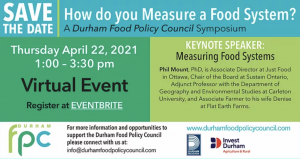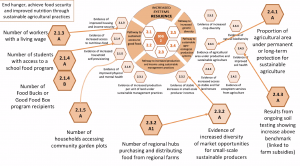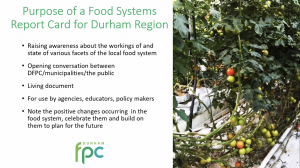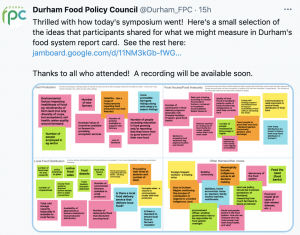 The Durham Food Policy Council (DFPC) hosted a symposium on April 22nd—Earth Day—to discuss the development of a Food System Report Card for Durham Region, and to brainstorm key indicators that would track the health of the region’s food system.
The Durham Food Policy Council (DFPC) hosted a symposium on April 22nd—Earth Day—to discuss the development of a Food System Report Card for Durham Region, and to brainstorm key indicators that would track the health of the region’s food system.
The DFPC is working towards a just and sustainable food system in Durham region, and, as noted in the Durham Food Charter (which provides the DFPC’s mandate), measurement is an integral part of that. Measuring is needed to understand what works, what is needed, and why.
The event began with a keynote address from food system scholar and practitioner Phil Mount; then Mary-Anne Martin, a member of the DFPC and a postdoctoral fellow at Trent University, presented on the council’s plans for the report card.
Mary-Anne outlined why a food system report card is important, as it would help to address: climate change, food insecurity, farm security, precariousness of food workers, and food waste — which have all been exacerbated by the pandemic.
How do you measure a food system?
In the keynote, Phil Mount underscored the complexity of food systems, and how we all view these systems through different eyes, perspectives, and priorities.
Why are we measuring what we’re measuring, and how do we know it’s moving us toward a goal? Phil pointed to some frameworks and resources, such as the UN’s City Region Food Systems (CRFS) Toolkit.
While discussing indicators that measure progress, he highlighted the need to build in “pathways to resilience.” (Check out this article, Now is the time to build sustainable food system resilience.)
 Phil pointed to the Sustainable Development Goal #2 (zero hunger) as an example, showing how a pathway model might be put into operation — each pathway shows a story of how work on the ground connects to high-level goals. That is to say, when you have high-level themes, they must be packaged effectively. One example offered was the Thunder Bay and Area Food Strategy, which has 7 pillars that are packaged in a way that is intuitive for people to understand each theme.
Phil pointed to the Sustainable Development Goal #2 (zero hunger) as an example, showing how a pathway model might be put into operation — each pathway shows a story of how work on the ground connects to high-level goals. That is to say, when you have high-level themes, they must be packaged effectively. One example offered was the Thunder Bay and Area Food Strategy, which has 7 pillars that are packaged in a way that is intuitive for people to understand each theme.
For a report card approach to measuring impacts and needs of a regional food system, Phil summarized that you must consider:
- What is it you want to measure?
- At what level or scale?
- What’s the baseline?
- Are you using primary or secondary data?
- Can you show a “pathway”?
- How will this be communicated?
It’s difficult to show direct causality in something as complex as a food system, but what you can show is that the changes made have set up conditions for pathways to certain goals.
Every step of the way, keep in mind — how will this connect to our goals? Phil Mount’s presentation slides are now available on the DFPC website.
A Report Card for Durham Region

Mary-Anne provided a summary of how the DFPC got here and their upcoming plans for the report card.
Developing a report card was among the recommendations in a 2013 report prepared by the DFPC, with support from the Durham Region Roundtable on Climate Change (DRRCC), which presented a scan and analysis of the local food system in Durham. This paper also provided an example report card, which you can view here. You can also access other resources and reports from the DFPC on their website here.
Then in 2019, two students took on a Trent Report Card Research Project to look more deeply into food system report cards. This included a literature scan, a report card analysis, and interviews.
The Trent student researchers identified 5 themes to start with, suggesting each have 2-3 specific indicators:
After the two presentations, the symposium concluded with breakout sessions for attendees to brainstorm measurable indicators for these 5 themes, as well as any other suggested themes and/or voices that should be included. You can see a snapshot of those sessions on Twitter.
While the DFPC is now gathering input on indicators, they plan to do a literature review/analysis and gather feedback via a roundtable from June to September; then from October to January 2022 they will begin data collection, with the plan to release the report card in Spring 2022!
This is just a glimpse of the 2.5 hour event — if you’d like more details, a webinar recording of part of the event is now available.
The GHFFA applauds Durham Region for taking on this important work!

